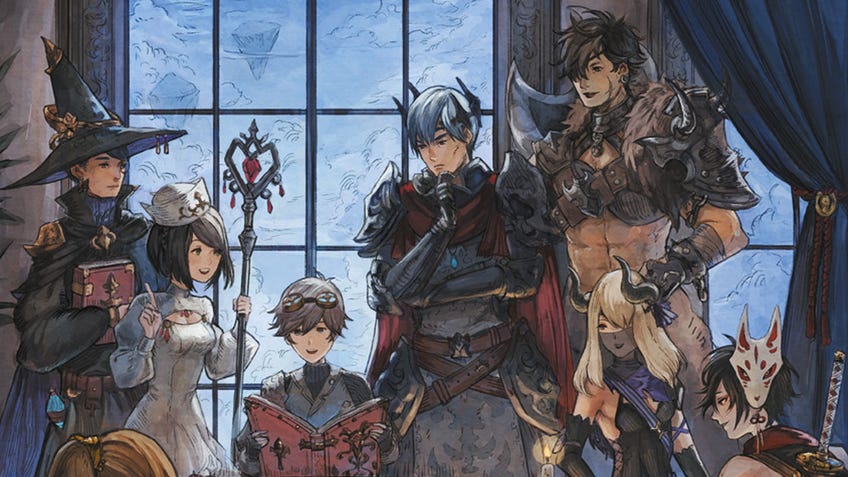6 tabletop RPGs like Final Fantasy to play after you finish FFXVI
Da-da-da-daa-dice.
Final Fantasy 16 is upon us, marking the latest major instalment in the storied Japanese roleplaying game series. With 35 years and dozens of games under its many, many belts, the Final Fantasy series has amassed legions of fans over the decades - including other game designers who have been inspired to create tabletop RPGs like Final Fantasy.
While there’s never been an official Final Fantasy tabletop RPG, tabletop RPGs inspired by Final Fantasy run the gamut from fan-made adaptations of some of the series’ most popular entries and ideas to fantasy RPGs that try to capture the feel and tone of Final Fantasy games without being direct translations.
Tabletop RPGs like Final Fantasy
Some of these include games based on other popular tabletop RPGs, like Dungeons & Dragons or Pathfinder, while others offer up original gameplay systems that aim to emulate the turn-based combat, sweeping exploration and character-driven storytelling of the video games.
Whether you’re after a roleplaying game that tries to be a one-to-one recreation of Final Fantasy with dice and paper, or something that gives you the excitement of exploring new yet familiar worlds with a party of characters, these tabletop RPGs like Final Fantasy are the perfect way to continue your adventures.
1. Beacon
Final Fantasy meets D&D 4E and Lancer
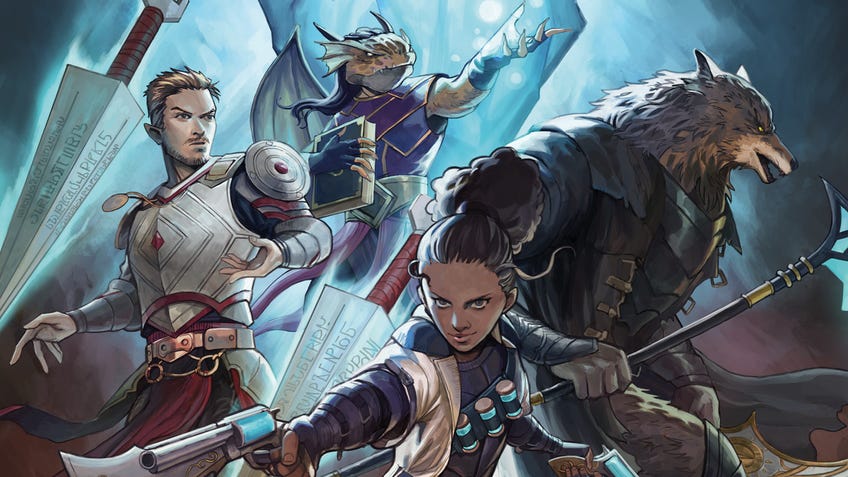
Tim Gonzalez’ Beacon has one foot in Final Fantasy 14 - the series’ critically-acclaimed MMO instalment - another in crunchy mech tabletop RPG Lancer and another in the classic Fourth Edition of veteran RPG Dungeons & Dragons. Is that three feet? It doesn’t matter, this is fantasy and you know what I mean.
Central to Beacon’s FFXIV influence is its adoption of a flexible job system that allows players to swap their character between more than two dozen different classes, ranging from the dragon rider - a clear homage to Final Fantasy staple, the dragoon - and the riftblade, who can literally cut between dimensions.
There are also less combat-centric professions that specialise in crafting and gathering (much like FFXIV’s Disciples of the Land and Hand), which can be used to fill your pockets with useful supplies and gold.
Each class gains progression separately, unlocking extra powers and skills across three levels - so you can choose which you want to focus on during each session.
Also drawn straight from Final Fantasy is each class’ limit break, a powerful ability that can only be used once between long rests - much like the slow yet mighty limit breaks seen since Final Fantasy 7.
If the Final Fantasy parallels weren’t clear enough in Beacon’s gameplay, its setting of The Source directly namechecks FFXIV’s world, as well as reflecting its crystal-based division into a number of different worlds and dimensions full of the magical technology magitech.
Beacon melds all these Final Fantasy influences to a combat system indebted to the crunchy tactical battles of mech RPG Lancer - with actions such as attacking, defending, healing and hiding playing out in a set order over distinct phases - and the option to use grid maps to track movement, range and line-of-sight.
When not in battle, gameplay borrows the d20 of classic D&D to resolve tests, combined with the tiered success levels of the Powered by the Apocalypse system used in RPGs such as Monster of the Week.
With its mixture of clear Final Fantasy inspirations and tried-and-tested tabletop RPG systems, Beacon is a Final Fantasy tabletop RPG that backs up its surface similarities with rich and rewarding gameplay.
Beacon’s playtest can be downloaded for free from Tim Gonzalez’ Itch.io page, with a physical release of the book crowdfunded via Kickstarter last summer due for release later in 2023.
2. Fight Item Run
A Final Fantasy tabletop RPG for fans of the classics

While most tabletop RPGs like Final Fantasy take inspiration from the later games in the long-running series - especially the 3D entries of Final Fantasy 7 onwards - Fight Item Run offers up a distinctly retro experience.
Tay Curreysmith’s RPG sticks to the simplicity indicated by its title, which borrows from the options of Final Fantasy’s turn-based combat menu. It’s a classic dungeon-crawler, in which the players’ party of characters venture into a series of rooms filled with monsters, fighting their way through in search of treasure, escape - or simple more monsters to fight, depending on what your party is after.
Gameplay builds on the beginner-friendly rules of Powered by the Apocalypse used in the likes of Avatar Legends, with players rolling two six-sided dice to judge their characters’ success in a variety of moves - from exploration to bartering.
The game splits the action into distinct combat and recovery phases as the party crawls between rooms full of enemies, giving them the chance to heal up and prepare before venturing forth. As well as monsters, dungeon floors can include merchants offering equipment, loot, stairs (or teleport pads, if you prefer) to the next level and opportunities for the characters to deepen their relationships and backstories, like any good RPG.
Adventures are also punctuated by ‘cutscenes’, adopting the cinematic approach of video games to further both narrative and gameplay as players dispatch tougher bosses and flash back (or forward) to explore their connection to the rest of the party, driven by a dedicated affinity system that offer rewards for forming more meaningful relationships.
While Fight Item Run keeps things as simple as its name, there’s plenty of room left for invention and creativity. Notably in the flexible approach to dungeons and weapons, leaving the function and effects of a specific bit of gear up to the players’ interpretation of its flavour text.
As suitable for Final Fantasy diehards who reminisce about the days of crisp pixel art and simplified mechanics as retro fans looking for something to scratch that Legend of Zelda itch, Fight Item Run is the ideal Final Fantasy tabletop RPG for a throwback adventure.
Buy Fight Item Run from publisher Whimsy Machine’s Itch.io page.
3. Eorzea RPG
Have you heard of the critically-acclaimed MMOTRPG?
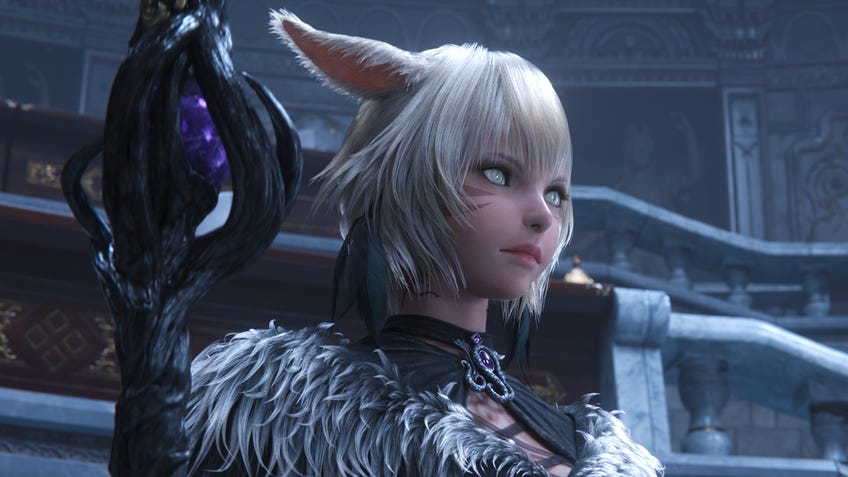
Named for Final Fantasy 14’s world, Eorzea RPG looks to turn Final Fantasy’s most recent MMO offering into an unofficial tabletop adaptation.
Fan-turned-designer Arkana Grey adapts XIV’s deep job system - which allows players to switch between dozens of different classes, from magic-users to melee attackers and beefy tanks - and combo-based combat into a simplified rules-light system that aims to balance storytelling with engaging gameplay.
That gameplay is driven by a single d20, rolled to work out turn order during battles and accuracy of attacks against opponents’ armour, evasion and skills - which can be aided by spending your turn to dodge rather than attack. Successful attacks simply deal one damage in most cases, whittling away similarly small health pools.
Available skills include spells drawn from Final Fantasy’s series-wide Black and White Mage classes, spread across dishing out damage and healing up injured party members. Like the video games, players can inflict or suffer status effects that grant advantages or disadvantages during fights.
In place of XIV’s powerful limit break abilities, Eorzea RPG allows players to unleash blessed abilities once per adventure, enabling more potent effects such as flight or invisibility. Characters can obtain new skills and strength as they progress up to level 10.
Since its appearance in 2022, Eorzea RPG has unfortunately vanished without explanation - leaving just its unfulfilled roadmap. If you’re able to track down a copy of the fan-made game, it’s well worth a look.
4. Fabula Ultima
A gorgeous, highly polished love letter to Final Fantasy and other JRPGs
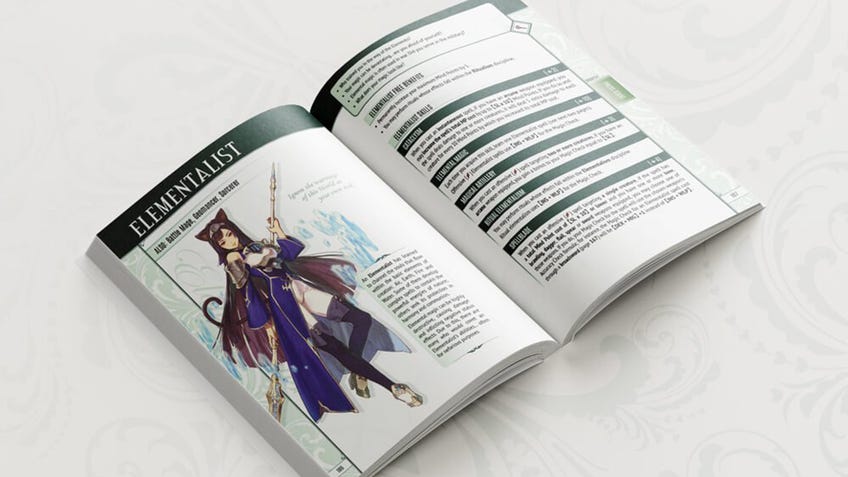
Fabula Ultima is one of the most recent tabletop RPGs like Final Fantasy to emerge, quickly making a splash thanks to its stunning artwork and approachable gameplay.
Designer Emanuele Galletto explicitly describes the game as a love letter to Final Fantasy and other influential Japanese roleplaying games, calling it a ‘TTJRPG’ - while its name translates to the not-so-subtle nod ‘The Last Story’.
Rather than a direct adaptation of Final Fantasy classes and creatures, Fabula Ultima uses the series as a leaping-off point for players’ own worlds and adventures.
Characters are formed from a combination of identity, theme and origin, providing a flexible setup that centres the RPG’s focus on telling memorable and meaningful stories between a party of characters. The importance of the relationships between party members is supported by the game’s bonds system, which creates interesting dynamics between characters using simple interactions - both positive emotions like ‘loyalty’, and negative feelings such as ‘inferiority’ - that can be drawn on to influence dice rolls in times of need.
Gameplay utilises the flexible system of Japanese TRPG Ryuutama, as players roll two dice determined by a combination of two applicable traits. For example, shifting a heavy rock might use ‘might’ and ‘dexterity’. The basic stats are represented by scaling dice - from d6 to d12 - that are rolled together during each test.
Combat is kept just as light, without sacrificing depth. A single roll judges both accuracy and damage on a hit, with turns alternating between the player characters and enemies with no fixed initiative order - allowing space to react and act naturally rather than fixed to a rigid structure.
While the book is full of illustrations that pay clear homage to Final Fantasy’s character designs and artwork - varying from pixel icons for items to beautiful drawings of its characters - Fabula Ultima toes the line between using Final Fantasy as a familiar touchpoint without offering up any fresh ideas of its own.
Its slick gameplay system, flexible character creation and well-released world-building make it a worthy, thoughtful tribute to Final Fantasy and other Japanese RPGs, rather than a cheap imitation. If you’re after a modern tabletop RPG like Final Fantasy, you can’t go wrong here.
Download Fabula Ultima’s free Press Start and Load Game quickstart booklets from its official website, and buy the game via Amazon US and Zatu (UK).
5. Final Fantasy RPG 3E
The ultimate Final Fantasy tabletop adaptation?
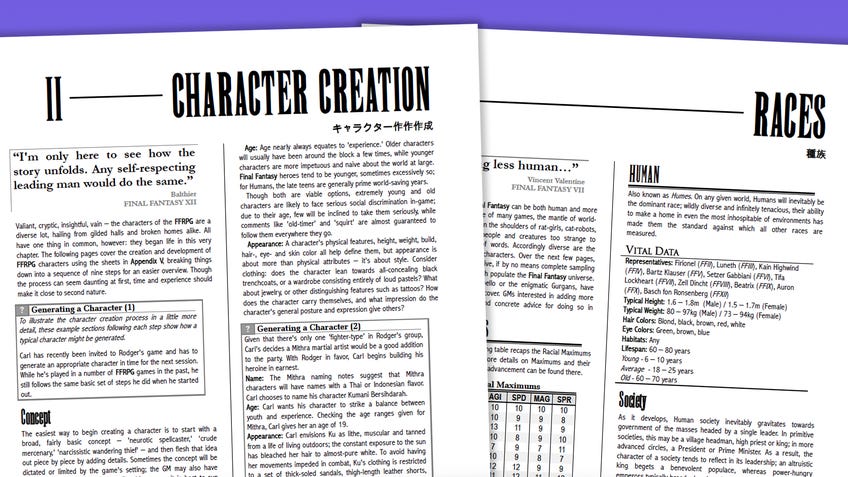
Many tabletop RPGs like Final Fantasy take inspiration from the series and use it to help shape their own original world, gameplay and stories, usually drawing from one specific game in the franchise. By comparison, Final Fantasy RPG 3E aims to be a highly faithful and all-encompassing tabletop adaptation of the entire franchise. (Or, at least, the first 12 numbered instalments in the series, plus their many spin-offs and sequels.)
This fan-made Final Fantasy RPG is about as close as Final Fantasy has come to getting a full-blown TRPG adaptation. Whereas other Final Fantasy-inspired games borrow general ideas or concepts and use them as influence, the FFRPG translates things directly from the video games to a pen-and-paper roleplaying game.
This includes elements like character species and classes, which range from the ubiquitous pompom-headed Moogles to the rabbit-like Viera, and jobs, which delve deep into the wide range of fighters, mages and other classes that have appeared across the series, including more obscure picks like the Rune Knight seen mostly in the Final Fantasy Tactics games.
Gameplay is similarly deep, using a percentile system similar to Call of Cthulhu or RuneQuest to calculate players’ success across the 100-point range of two ten-sided dice. These rolls can be modified by a wide range of traits and attributes, including basic stats such as strength, vitality and agility through to more granular stats such as magic evasion and magic armour (in addition to standard evasion and armour).
The Final Fantasy RPG offers a far more faithful adaptation of Final Fantasy than many Final Fantasy RPGs, with a deep commitment to trying to bring the series directly across to the tabletop. This means that it can be a bit more intimidating to pick up than several of the other games on this list, but you’ll be amply rewarded if you’re looking for the closest recreation of Final Fantasy in a TRPG yet.
Download Final Fantasy RPG 3E’s rules for free over on its website.
6. Anima Prime
Story-focused action and summons
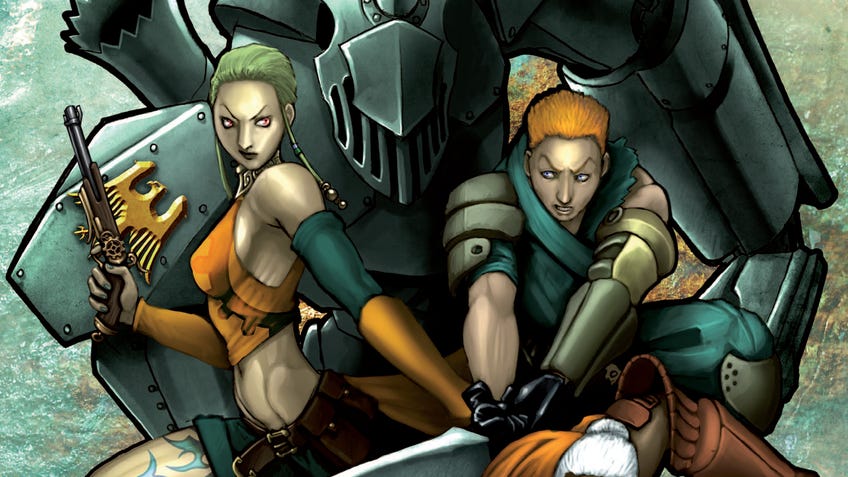
Anima Prime designer Christian Griffen cites two key inspirations on the tabletop RPG: Final Fantasy and animated TV show Avatar: The Last Airbender. These two influences come together in the RPG’s mixture of Final Fantasy’s story-driven, character-centric adventures and Avatar’s fast-paced, fluid battle scenes.
Anima Prime’s roots in Final Fantasy can be easily seen. Players’ characters have the ability to wield elemental powers, utilise the magical effects of soulbound weapons and even summon powerful eidolons - powerful magical creature companions that share their name with the incredible summons central to Final Fantasy, such as Ifrit, Shiva and Bahamut.
These powerful abilities drive Anime Prime’s combat, which sees players building up strikes from their pool of six-sided dice before unleashing blows against enemies. The action is made exciting and fast-paced by the use of manoevures and stunts that provide an anime level of energy as characters move around the battle arena, interact with the environment and talk mess to their opponent. Especially big moves can earn ‘awesome tokens’ that act like inspiration, granting free strikes, actions and other impressive feats.
Like both Final Fantasy and Avatar, though, it’s not an RPG solely about big moves and flashy powers. Character development, storytelling and world-building underlines every battle, with players having the ability to strive towards ‘achievements’ - goals that serve as mini-objectives during fights. For example, clambering up the side of a gigantic enemy or unlocking a door to access a new area.
The dice system is also utilised out of combat, as players roll their d6 pool to judge success - needing a certain number of dice showing 3 or more depending on the difficulty of the test.
Characters are rounded out by their development around both their powers and a driving passion that gives them a purpose during adventures - from regaining lost pride to simply proving their worth.
Bringing together both rich storytelling potential and punchy combat, Anima Prime channels the spirit of Final Fantasy’s most memorable fights in a tabletop RPG.
Buy Anima Prime from DriveThruRPG, or download its Creative Commons rules for free from its website.
